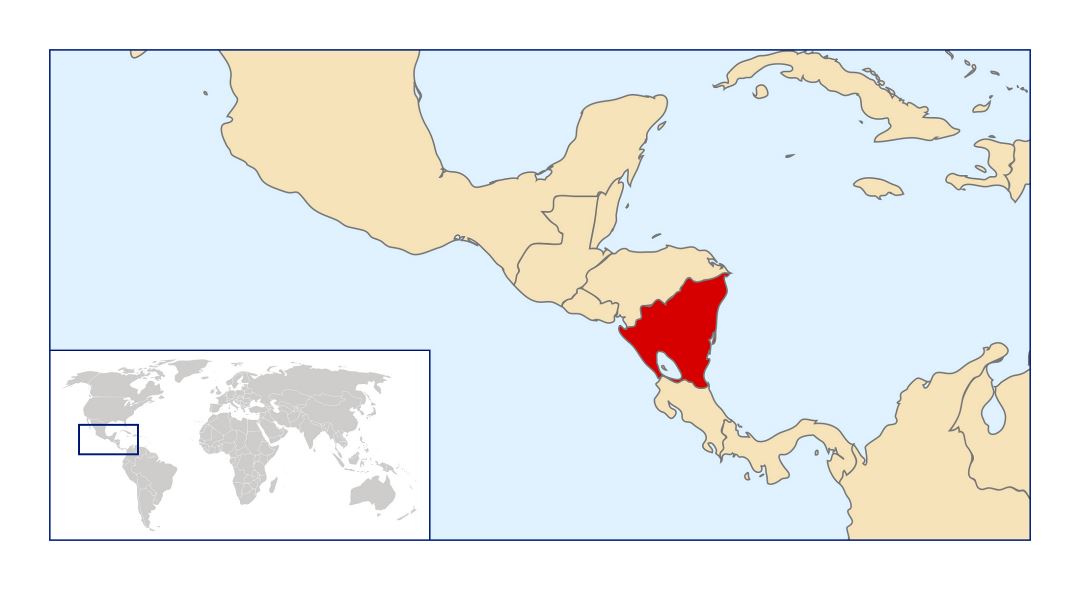What's Going on in Nicaragua
A crisis has broken out in Nicaragua, one of the fastest growing economies in all of Latin America. The small Latin American country has been affected by the current economic crisis happening in Venezuela, leading to a domino effect and devastation that has led to huge migration towards neighboring countries and a migrant caravan that is now making its way through Mexico, with the hopes of entering and settling in the United States.
Image Credit: Mapsland
Daniel Ortega is the leftist current president of Nicaragua, in office since he was elected in 2007. Since his early years, he has devoted to the countries politics. Years back, he went to Cuba to receive guerrilla warfare training from Fidel Castro’s communist government. He has always had close relationships and has had alliances with other left-wing leaders such as Hugo Chavez, Nicolas Maduro, and the Castro brothers.
He has been known for the implementation of wealth redistribution, land reforms, and literacy programs. As imagined, these programs can seem to be costly and Nicaragua itself was not able to sustain them, so for many years, the Venezuelan government aided these programs which mostly benefited Nicaragua’s working class.
The whole problem unraveled alongside with the Venezuelan crisis. Summed up, what happened in Venezuela was that their economy solely depended on oil, and when the demand and prices of it dropped, the economy went down with it. The economic crisis in Venezuela caused their government to cut the aid being received by Nicaragua for these programs.
Protests in Nicaragua. Image Credit: Jairo Cajina."Nicaragua is ruled by a communist government. Sadly, the minimum wage is $100 a month, which is not enough to buy basic supplies. On April 17, 2018, the government passed a reform declaring a higher percentage of taxes, meaning their minimum wage would decrease. Earning less affected everyone from businesses in the private sector as well as older people in the workforce. Two days later, on April 19, 2018, the first protest took place outside a University. The government took action, decided to kill anyone who disagreed with their beliefs, and started one of the deadliest massacres in our country’s history," commented Isabella Coen, a student at the American University of Paris, native to Nicaragua.
Violence in Managua. Image Credit: Alejandra MaltezThe United Nations accused Daniel Ortega of being guilty of the condemnation of human rights along with his military, his police etc. Donald Trump has put Nicaragua by the side of Cuba and Venezuela and classified them as a "Troika of Tyranny".
Protests on the streets of Managua. Image Credit: Alejandra MaltezThe effect on this crisis in Nicaragua is of a negative six percent growth this year in the Nicaraguan economy and a loss in more than a billion dollars in investment capital.
Nicaraguans are suffering this crisis and are now fleeing to other central American countries as well as the U.S., "My family had their life in Nicaragua and all of a sudden things became very dark. My little brothers who were in school were taken out because getting there became very dangerous. It went from being one of the safest countries in Central America, where you felt so much freedom and peace, to a place where there is so much tragedy and violence. The feeling of not knowing what to expect next, since they have been taking over and destroying private properties, makes you feel extremely unsafe. Having to leave the country has not been easy for many Nicaraguan families including my own," says Isabella.
"Long live resistance" banner on display in a Protest. Image Credit: Alejandra Maltez.







